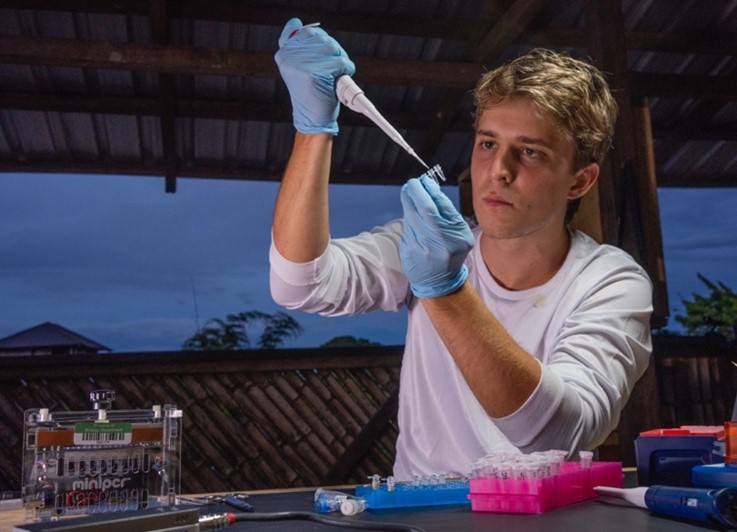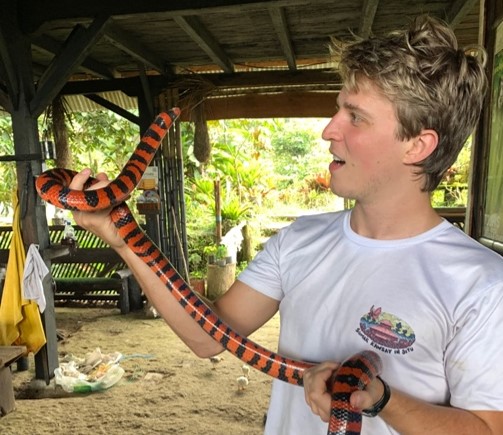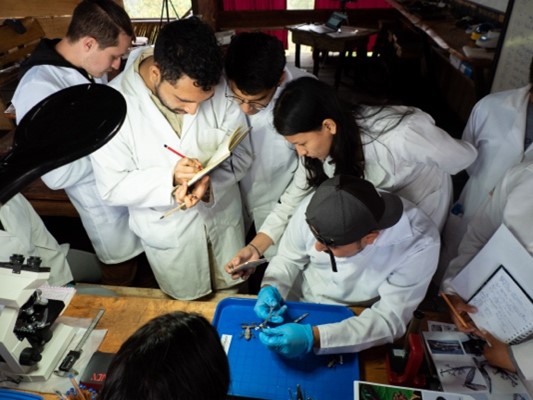Ecuador alum returns to the field to document species DNA
December 9th, 2021 | SIT Study Abroad
By Zane Libke

During my time with the fall 2019 Ecuador: Comparative Ecology and Conservation program, I was captivated by the Ecuador’s immense, thriving biodiversity. I spent my Independent Study Project (ISP) studying frog communities at the research station Sumak Kawsay In Situ. While this study helped to designate areas of conservation priority, contributed to the first field guide on herpetofauna in the region, and registered several undescribed species, I wanted to do more.
DNA sequencing is an indispensable tool in biodiversity research, but it’s incredibly difficult to access in the most biodiverse regions of the world.
Back home, I learned about new advances in portable sequencing equipment and quickly realized the potential impact this kind of technology could have if deployed in biodiversity hot spots. DNA sequencing is an indispensable tool in biodiversity research, but it’s incredibly difficult to access in the most biodiverse regions of the world.
With new advances in portable sequencing equipment and my training in genomics, I realized that this was a problem I could help to solve. With a $5,000 grant from my alma mater and some of my own personal savings, I moved to Sumak Kawsay In Situ field station (SKIS) to start the first field genomics lab in Ecuador together with SKIS, Fundación Ecominga, and INABIO.

With this field-based genomics lab, I can perform the entire process of DNA extraction, amplification, visualization, and sequencing without ever leaving the field. Currently, I’m conducting field and laboratory work to generate sequence data for all 149 species of reptiles and amphibians registered at the station (download the guide here).
For the majority of these species, little or no genetic sequence data exists. Thus, this project will not only help to describe several new species we’ve encountered but will also contribute novel sequencing data to a public-access database for use in worldwide comparative genetic diversity studies.
In a collaborative project with Fundación Ecominga and IKIAM, we are using cutting-edge environmental DNA sampling to detect new populations of the critically endangered toad Atelopus palmatus. Most organisms leave behind traces of DNA in their day-to-day life, and we can detect and sequence these DNA fragments in our genomics laboratory. With this research, we can ensure that Ecominga’s next conservation purchase in the area will protect this important species.
The genetic information that will come out of this project will greatly contribute to our knowledge of Ecuador’s astounding biodiversity.
With Ecominga, I am also working to describe several new frog species from the Cerro Candelaria reserve and developing a method to sample large mammals using fur samples found near camera traps throughout the Corredor Ecologico Llanganates-Sangay (CELS).

In January and February 2022, I will be working with Instituto Nacional De Biodiversidad (INABIO) to sequence museum samples of frogs, reptiles, mammals, insects, plants, and fungi, and train their laboratory technicians in nanopore sequencing. Over the years, INABIO has amassed the one of the most comprehensive biological collections in the country. Just like the herpetofauna at SKIS, many of these specimens have never been sequenced by science. As such, the genetic information that will come out of this project will greatly contribute to our knowledge of Ecuador’s astounding biodiversity.
At SKIS, environmental education is central to what we do. As such, we are making every effort to teach Ecuador’s next generation of scientists and conservationists in the use of these cutting-edge molecular biology techniques.
We are making every effort to teach Ecuador’s next generation of scientists and conservationists in the use of these cutting-edge molecular biology techniques.
Together with the university IKIAM, we put on the first field-based herpetology and genetics course in Ecuador, where students learned both the field and laboratory aspects of herpetology and genetic analysis, all without leaving the rain forest. At SKIS, we are continuing these efforts by running a volunteer program, where students participate in our research projects, gaining valuable experience and training in both herpetology and genomics.
Zane Libke participated in SIT Ecuador: Comparative Ecology and Conservation in fall 2019. He is a graduate of Davidson College.
